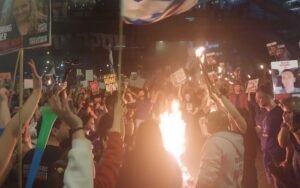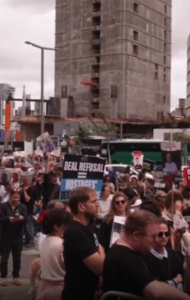On Saturday, 31 March, 2024, thousands of protestors took to the streets of Jerusalem and Tel Aviv to voice their dissatisfaction with Benjamin Netanyahu, the Prime Minister of Israel, due to his handling of ongoing Gaza genocide, being an obstacle to achieving ceasefire and the release of hostages held by Hamas.
This followed Israel recalling its negotiators from Doha as it blamed Hamas for reaching a dead end in their talks due to the group’s demands.
In the especially intense demonstrations in Tel Aviv, roads were blocked by protestors, including families of hostages, who demand the release of the captives and early elections. These events were centred around Kaplan Street, Hostages Square and Begin Street. The situation escalated as clashes broke out between the protestors and law enforcement. Israeli police described the protests as illegal and endangering behaviour for the safety of the public, and used water cannons to disperse the protestors. By the end of the night, 16 protestors were arrested and 9 were fined (totalling 1,000 shekels (approximately ₹ 22600)) for disrupting traffic causing disturbances.

Meanwhile, in Jerusalem, hundreds of protestors gathered outside the residence of Benjamin Netanyahu, condemning his far-right government for its failure to secure the release of hostages. The protests have taken place at a crucial time as truce talks between Israel and Hamas are set to resume in Cairo on Sunday. Arranged by international mediators, the talks aim to achieve temporary ceasefire and release of the captives.
Preceding Events, Death Toll and Uncertainty
Similar protests took place last week as well, when about 300 family members of hostages and their supporters gathered outside the Israeli military’s headquarters in Tel Aviv.

The protests are a reflection of growing frustration among Israelis over the prolonged conflict in Gaza, now in its sixth month. Since the outbreak of hostilities on 7 October, 2023 due to Hamas’ surprise attack on Southern Israel from the Gaza Strip, the area has witnessed severe devastation. According to Israeli authorities, at least 134 Israelis and foreign nationals are captive in Gaza, 33 of whom are presumed dead. Latest casualty figures reveal that at least 32623 and 1139 people have been killed in Gaza and Israel respectively.
These protests mark some of the largest in Israel since the outbreak of the war. More are schedule to take place in Jerusalem today.
Victims’ Voices and Pressure on Govt.
Netanyahu’s critics accuse him of prioritizing political interests over the safety and well-being of Israeli citizens, particularly the hostages.
Einav Zangauker, the mother of Hamas hostage Matan Zangauker, stated that Netanyahu’s handling of the hostage situation is “incomprehensible and criminal,” declaring him an obstacle to a deal for the release of the captives. She is just one of the many protestors demanding that Netanyahu be replaced at the earliest.
Hadas Calderon, whose two children were freed from Gaza while their father, Ofer Calderon, remains in captivity, emphasized that negotiations were the sole means by which her children were freed and urged for a comprehensive agreement to secure the release of the remaining hostages.
Former hostage Raz Ben Ami, freed in November after a deal brokered by Qatar and the USA, appealed directly to Netanyahu to speed up talks for the release of the rest, telling him not to return without a deal.
Demonstrators from various cities across Israel are voicing their discontent, with some calling for Netanyahu’s immediate resignation and some demanding decisive action for the release of hostages held by Hamas.
As tensions continue to escalate, the Israeli government faces increasing pressure to address the grievances the people and to effectively negotiate with Hamas in order to secure their release and ending the war.











Comments 1